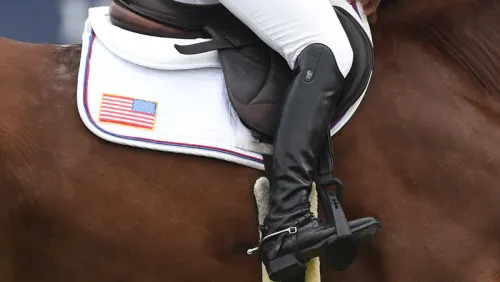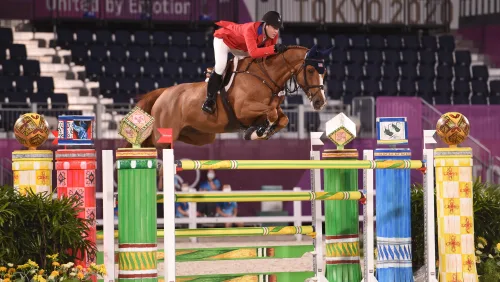Our columnist questions who will look out for the horses at events without structured, enforceable rules.
Many people have heard about the Fédération Equestre Internationale’s attempts to stop the Global Champions League team show jumping series, but few are involved.
While the popular Longines Global Champions Tour operates under FEI rules, the GCL—a creation of GCT owners Jan Tops and Frank McCourt—seeks to operate as an unsanctioned event outside of FEI established sport, and the Belgian courts have temporarily allowed them to continue based on the allegations that the FEI’s exclusivity clause violated the European Union fair competition laws. Big money and great venues have attracted the world’s top riders and owners to the GCL, which seeks to have a competition series on par with FEI Nations Cup and championship competitions.
Part of the dispute involves the sufficiency of disclosure to the FEI of the rules and conditions under which the GCL competitions will be run. The FEI must be concerned about the welfare of the horses and whether sufficient rules exist to safeguard their welfare.
The FEI may ban athletes from competing at FEI events, including the Olympics, if athletes have competed in unsanctioned competitions within six months prior. So the GCL-FEI dispute brings the issue of unsanctioned events to the fore.
Why You Should Care
Although a “big deal” at the FEI and elite show jumping level, the dispute involves very few U.S. Equestrian Federation members and doesn’t seem very important. The reason is simple: As part of the GCT, the league is an elite show jumping circuit for the elite show jumping crowd at elite venues throughout the world. Champagne, fine watches and diamonds compete with top riders, owners and horses for television time. It is a competition for the top international riders in the world and for wealthy individuals who can pay high fees for the right to compete against the world’s best. The event gains exposure through live stream and other media that provide value for the league and its sponsors. It would appear at worst to be a harmless exercise in celebrity self-indulgence and conspicuous spending.
ADVERTISEMENT
GCL contends that the FEI is improperly restricting its right to do business and financially monopolizing the sport. The FEI contends that events should be FEI sanctioned to maintain the integrity of the sport and the welfare of the horse.
It’s easy to dismiss this as an organizational spat just about the money. Financial considerations weigh on both sides, whether profit for GCL or fees to FEI. Only a handful of riders and owners are affected by the potential ban from FEI and Olympic Games. National federations receive no fees or revenue. Yet the outcome of this dispute will determine the ability for unsanctioned leagues to hold equestrian competitions across all disciplines in all countries, so this concerns all horse people.
The FEI demonstrates a commitment to horse welfare supported by well-developed rules and enforcement mechanisms. Equine Anti-Doping Controlled Medication Rules are modeled after the World Anti-Doping Code. The FEI’s horse welfare rules have been developed over the years by experienced committees of horsemen and women. There is an administrative procedure for infractions and an independent FEI Tribunal to adjudicate infractions of FEI rules when necessary. One has only to go to the FEI website to see its rules governing equestrian sport and its commitment to clean sport. The GCT website demonstrates a commitment to top level sport but is devoid of any information concerning the rules of competition, drug testing or horse welfare other than reference to its mobile vet clinic.
Unsanctioned events create a serious risk of horse abuse. The history of all human athletic sport is that, without the strict enforcement of rules to prevent cheating and doping, athletes will cheat. Human athletes knowingly take risks when cheating. When a horse is part of the sport, the horse is an unwilling and unknowing participant. There is no one to protect the horse’s interests from improper techniques and anti-doping. The more money involved in the competition, the greater the incentive to put the horse’s interest behind those of the owner and athlete. While most horse owners maintain only the highest regard for horse welfare, time has shown that a small percentage will disregard the horse’s welfare in pursuit of the prize.
Enforcement of regulations is a necessary part of fair sport. Unfortunately, the enforcing organization must take a position that is adversarial to the athletes, owners and promoters. One of the most important roles of the FEI and national federations such as the USEF is the impartial administration of the rules of clean sport. If the GCL is unable or unwilling to commit to implementing the rules of equestrian sport and allowing impartial, unfettered enforcement by a neutral body and proceeds as an unsanctioned league, then there is no assurance that the horses’ welfare will be protected.
Besides issues of horse welfare, horses competing in unsanctioned events can undermine the fairness of FEI competitions. Allowing horses to train with improper techniques or with medications otherwise prohibited under FEI rules in unsanctioned events and then competing in an FEI event shortly after can create an unfair advantage. Horses can be “tuned” at the unsanctioned event prior to an FEI event or even an Olympic Games. Even though national laws against horse abuse could arguably apply, the sophistication of the violations of rules can be such that FEI-trained stewards and officials are required to detect them.
Public Perception
ADVERTISEMENT
The proliferation of unsanctioned events in other disciplines and within national federation governance structures will increase the risks of abuse and injury to horses and riders from unsafe practices. Other disciplines such as endurance and eventing pose severe risks of injury to both. Recent examples are easy to find.
Reports of injuries to horses in competition cause international outrage. At least with sanctioned events, dangerous practices can be identified, eliminated and wrongdoers punished. The general public does not differentiate between unsanctioned events and FEI, USEF and affiliate sanctioned competitions. Injuries to horses get worldwide press that affects the entire sport.
FEI rules of fair play and clean sport must be adhered to by all athletes who participate in the Olympic and international equestrian sport. Without responsible oversight, horses are left unprotected. In human-only sports, the athletes can decide what directly affects their competitive abilities and longevities. In equestrian sport, the horses need a public advocate. The FEI and national federations currently fulfill that duty.
The correct outcome of the GCL and FEI dispute guarantees that the rules of fair play and clean sport are rigorously applied and the welfare of the horse is assured. Financial interests and sponsorship rights are well represented and are easily understood by the courts, but who represents the horses?
The FEI has developed a rulebook and enforcement system over the years with established best practices for animal welfare. Any legal solution must ensure our horses’ welfare at the same level as the FEI and balance the interests of the horses along with the interests of the named parties.
Armand Leone of Leone Equestrian Law LLC is a business professional with expertise in health care, equestrian sports and law. An equestrian athlete dedicated to fair play, safe sport and clean competition, Leone served as a director on the board of the U.S. Equestrian Federation and was USEF vice president of international high performance programs for many years. He served on USEF and U.S. Hunter Jumper Association special task forces on governance, safety, drugs and medications, trainer certification, and coach selection.
Leone is co-owner at his family’s Ri-Arm Farm in Oakland N.J., where he still rides and trains. He competed in FEI World Cup Finals and Nations Cups. He is a graduate of the Columbia Business School in New York and the Columbia University School of Law. He received his M.D. from New York Medical College and his B.A. from the University of Virginia.
Leone Equestrian Law LLC provides legal services and consultation for equestrian professionals. For more information, visit equestriancounsel.com or follow them on Facebook at facebook.com/leoneequestrianlaw.















